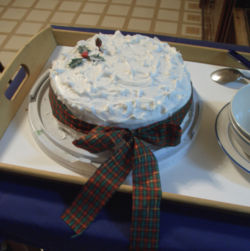Christmas cake
Christmas cake is a type of fruitcake served at Christmas time in the UK, Ireland and many Commonwealth countries.
A Christmas cake may be light or dark, crumbly-moist to sticky-wet, spongy to heavy, leavened or unleavened, shaped round, square or oblong as whole cakes, cupcakes ("fairy cakes" in England), or petit fours, with frosting, icing, glazing, dusting with confectioner's sugar, or plain, etc.
A particular favourite of many is the traditional Scottish Christmas cake, the Whisky Dundee. As the name implies, the cake originated in Dundee and is made with Scotch whisky. It is a light and crumbly cake, and light on fruit and candied peel—only currants, raisins (sultanas) and cherries. This Christmas cake is particularly good for people who don't like very rich and moist cakes. As with all fruitcakes, the almonds (or other nuts) can be omitted by people who don't like them.
At the other end of the Christmas cake continuum, the apple creme Christmas cake is a rich mix of finely sliced apples, raisins and other fruit, with eggs, cream cheese, and heavy whipping cream.
In the middle of the spectrum is the mincemeat Christmas cake, which is simply any traditional or vegetarian mincemeat mixed with flour, eggs, etc., to transform it into a cake batter; or it can also be steamed as a Christmas pudding.
Christmas cake in other countries
In Japan, Christmas cake, traditionally eaten on Christmas Eve, is simply a sponge cake, frosted with whipped cream, decorated with strawberries, and usually topped with Christmas chocolates or other seasonal fruit. By extension, Japanese women over the age of 25 have occasionally been called "Christmas cake" to express the traditional Japanese idea that women over 25 are undesirable as marriage partners. This is a play on the idea that Christmas cake is no longer desirable after the 25th. However, as the age at marriage has increased, this metaphor has begun to be replaced with toshikoshi-soba, a noodle dish traditionally eaten on the 31st.[1]
In the Philippines, Christmas cakes are rich yellow pound cakes with macerated nuts or fruitcakes of the British fashion. Either way, both are soaked in copious amounts of brandy or rum mixed with a simple syrup of palm sugar and water. Traditionally, civet or ambergris musk flavoring is added, but rosewater or orange flower water is more common now, as civet musk and ambergris have become very expensive. These liquor-laden cakes can usually stay fresh for many months provided it is handled and made properly. Because of its long shelf life, it is a very popular type of gift for Christmas and one cake made the previous year is sometimes saved for the next Christmas to symbolize union with "Christmases past", or may be consumed for the following Easter.
References
- ^ Hendry, Joy (2003). Understanding Japanese Society, Third Edition. London: Routledge.
Categories: Christmas food

